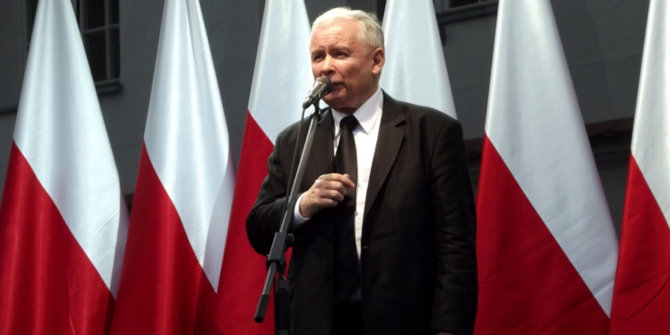With the recent election of a new party leader, the Swedish social democrats have the opportunity to regain their status as a ‘catch-all’ party, argues Christian Kellermann.
This article originally appeared on Social Europe on 22 March.
With a new party leader in place, the Swedish social democratic party (SAP) is once again trying to find its role in the Swedish political landscape – a landscape that has been transformed greatly over the past six years of conservative government, and arguably even more over the past three decades, of which a majority of years saw SAP governments
The debate within the party, as well as that of the media and commentators trying to figure out the modern mandate of social democracy, is concentrated around the topic of how to once again become the “catch-all” party it once was. There is an unresolved and widening gap between the party’s ambitious political aspirations on the one hand and its technocratic and perceived political possibilities of actually changing matters on the other. As the conservative party (Moderaterna) has developed into more of a “catch-all” party itself – by broadening its political scope and popular support alike – SAP has much to prove before it can possibly take the lead again.
The heyday of SAP’s predominance coincided with creating universalism in the notion of the welfare system. The corresponding reforms had a tangible impact on the basic insurance and the quality of Swedes’ lives. Be it the pension reforms, day care expansion, sick leave possibilities, parental leave or the expansion of higher, free education – all these reforms were derived from the social democratic idea of the general welfare. The system delivered to all, and was paid for by all. And as long as a large majority of people acknowledged its benefits (individually as well as collectively) they accepted paying ever higher tax-rates (top marginal taxes reaching up to 70 per cent at one point).
The descent of SAP’s predominance coincided with an increasing questioning of the efficiency and logic behind the welfare institutions. They have become more and more regarded as overly opaque and failing to deliver. Against that background the market cocktail seemed quite tempting to many and like in many other countries, the full consequences of many liberalisation practices were not understood until decades later.
The welfare system of Sweden has thus changed dramatically in the last three decades and SAP was part of this process. It can also be argued that SAP has lost the exclusive ownership of its own model. When the conservative government took office in 2006 and further liberalised the economy and welfare institutions, the road was already well paved. This joint responsibility for liberalisation policies between SAP and the conservatives alike makes it difficult for SAP to take a decisive stance in issues of welfare, taxation, labor market regulation, and even finance. And such wavering and hesitation will not help push its main competitor out of the “catch-all middle” of society.
To be sure, the conservative government has a tough time as well. Public dissatisfaction with increasingly dysfunctional welfare institutions is growing and the current Swedish economic success story is built on economic quicksand, exposing severe structural fragilities under shiny growth figures. There is in fact a good time window looming for SAP to re-conquer its own model and re-gain the mandate to shape Sweden’s future. It requires, however, the definition of a “catch-all” project. This, once more, has to be built on a holistic approach to rebalance the country with a special focus on growth generation, the work-life-dimension and a sustainable life-style. Defining certain limits for markets is imperative for that, and so is the fight for substantial sources of finance for this project. Perceiving and preaching the potential of a European value added for this mission would only be consequent.
This post is part of the ‘Basic Values Debate’ jointly organised by the Friedrich-Ebert-Stiftung and Social Europe Journal. Read more on social democratic parties: ‘The Future of the SPD as a Catch-All Party’.
Please read our comments policy before commenting.
Note: This article gives the views of the author, and not the position of EUROPP – European Politics and Policy, nor of the London School of Economics.
_________________________________________
 Christian Kellermann – Friedrich Ebert Stiftung
Christian Kellermann – Friedrich Ebert Stiftung
Christian Kellermann joined the Nordic Office of the Friedrich Ebert Stiftung (FES) in 2009. Previously, he worked as a project manager for European economic and social affairs at the FES in Bonn and Berlin. Before joining the FES, he worked as a financial market analyst in Frankfurt and New York. He holds a PhD in political economy and studied political science and economics in Frankfurt. Among his major fields of interest are global financial markets and the future of the welfare state.



